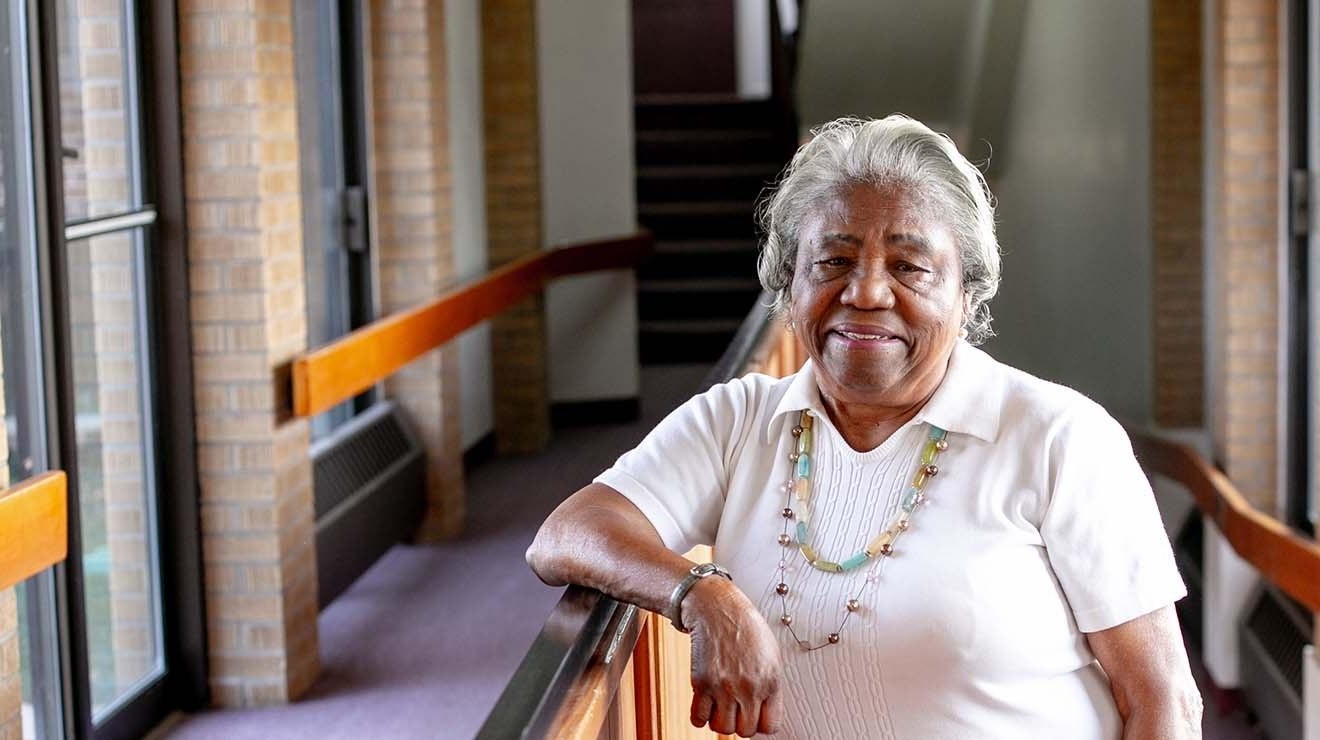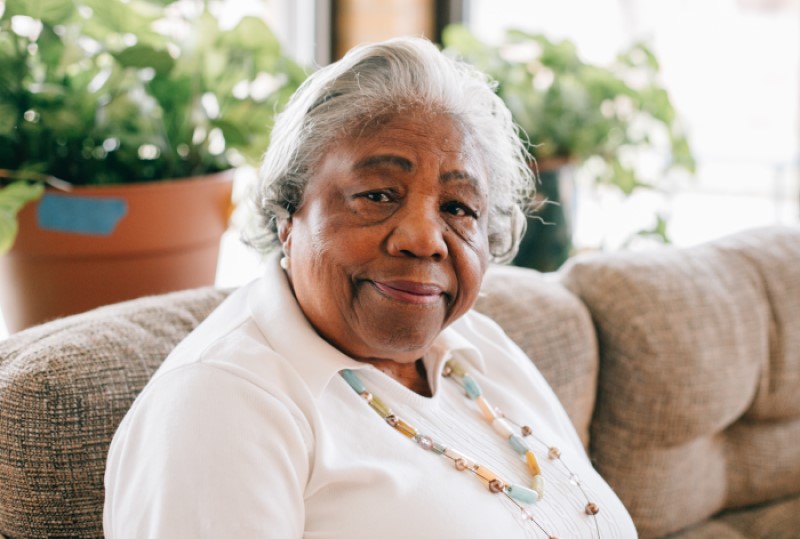
June Waller, photographed in Colorado Springs on Dec. 3, 2022. Photos by Parker Seibold / Special to The Colorado Trust
June Waller, photographed in Colorado Springs on Dec. 3, 2022. Photos by Parker Seibold / Special to The Colorado Trust
For the last five decades, June Waller, 86, has worked tirelessly to better her community.
“My life is a means of chasing gaps,” Waller said. “If there’s a gap in a system, how can I close the gap? How can I help close the gap? And that doesn’t mean me being out front—that means, hey, I had a little idea on how to close the gap. And I was thinking about that and putting all this stuff together.”
Anyone who knows anything about affordable housing in Colorado Springs knows who Waller is.
“I tell people who ask me about what’s going on in Colorado Springs, I say, ‘well, call June Waller,’” said Kevin Marchman, chairman of the National Organization of African Americans in Housing. “She’ll tell you without all the knucklehead stuff.”
Waller started her work in housing at the Colorado Springs Housing Authority in the 1970s. Since then, she’s worked with organizations like the Women’s Voters League, managed Denver’s Section 8 housing program, started a senior meal program that’s still running today, and was a delegate to Washington, D.C. during the Carter Administration, to name just a few of the things Waller has done over her long career.
“One of the most important events was when President Jimmy Carter invited me to his inauguration with the delegates from Colorado headed by Wellington Webb. The fact that I received an individual invitation kept me walking on a cloud for many days,” Waller wrote in an email.
“The inauguration was fabulous. I attended more parties in two days than you could ever imagine. But the greatest heart thump was my invitation to return to D.C. once he hired his cabinet. Patricia Harris was appointed the first Black woman as secretary of HUD [Housing and Urban Development].”
To this day, Waller receives a Christmas card from the Carters every year.
Marchman has known Waller professionally for more than 40 years, but personally for even longer. Waller and Marchman’s mother are friends. When Marchman was working at the Colorado Housing and Finance Authority in the 1970s, he would run into June at housing conferences. She was working for the Colorado Springs Housing Authority at the time.
“I could tell at that time that June was no-nonsense,” said Marchman, who is the former assistant secretary of U.S. Housing and Urban Development. “Let’s get things done for the community, and that has been her style as long as I’ve known her.”
This year, the National Organization of African Americans in Housing (NOAHH), which Marchman helped to start and has worked on for the last 25 years, gave Waller a legacy award for her lifetime of achievements.
“The fact that she’s been able to do what she has done for as long as she has, I think is remarkable,” Marchman said. “And the way in which she spends her time is always something—it’s somebody who needs something, somebody who needs a better apartment or an apartment to live because of one reason or another, you would call June.”
NOAAH doesn’t give the legacy award every year. Acknowledging Waller this year—on the organization’s 25th anniversary and after the COVID-19 pandemic disrupted plans for an in-person conference several times—was an obvious choice, Marchman said.
In the past, NOAAH gave legacy award recipients a plaque, but Waller didn’t want one. Instead, she asked for a gift card that she could give to someone else who needed it.
“I’ve never seen anything so humble,” Marchman said.
Waller started her work in housing in 1972 when she was hired by the Colorado Springs Housing Authority. She would drop her kids off at school in the morning, take business classes at the University of Colorado in Colorado Springs, and work for the authority in between picking her kids up and making dinner.
By that time, she and her family had been in Colorado Springs a little less than a decade. Waller, her then-husband Vincent Lopez Waller, and two of their children moved there in 1964 from Harlem in New York City, where she and her husband were both born and raised.
Waller’s husband joined the Air Force when he was 17, which would take the family to Germany and back several times in the 1960s, where she started her college studies.
“I did my first two years at the University of Maryland [in Germany], and I started that ‘cause we were playing Bingo,” Waller said. “There was three other ladies; we had four of us playing Bingo, and none of us ever won anything. So we decided that we would start college.”
Even at age 86, Waller is still focused on closing gaps. This past summer, she was finally able to get the resources together for a summer program for a few local teens. She wanted to expose them to new things, like learning about their finances and how to manage them, or how to put on a good face to meet new people. They also learned about different career tracks and civic engagement.
“I had them pull out their telephone and look at themselves in their telephone, look at all the different faces they could make,” Waller said. “And then they needed to pick a face that they wanted other people to see, and be able to flash that face without even thinking.”
The faces came in handy when the teens and Waller ran into Dianne Primavera, Colorado’s lieutenant governor.
“The 19-year-old, right away, she had that face, and I’m saying she listened,” Waller said. “You never know who’s listening to what you have to say.”
The youth summer program was supported by The Colorado Trust, which also supported another one of Waller’s projects, the Hillside Advisory Team (HAT). Rene’ Foster is a member of HAT and helped Waller with the initiative.
“It wasn’t just a youth work program for her,” Foster said. “She wanted to expose the youth to more than just working—she wanted to expose them to opportunities through helping them understand voting, connecting them with people who could help them, even when they were no longer in the program. It was really encouraging to watch how Miss June really worked hard to make sure the youth understood what was happening.”
HAT is an organization of community members who live in Hillside, a historically Black, working-class neighborhood in southern Colorado Springs and one of the oldest neighborhoods in the area. HAT advocates for positive community changes and works against gentrification.
“When June has an idea and a vision, she is relentless,” said Mia Ramirez, a regional manager for The Colorado Trust who worked with Waller to create HAT and other projects. Much of this support was via The Colorado Trust’s Community Partnerships strategy, which was concluded at the end of 2022.
One of those projects was to use a combination of public and private funds to restore and renovate the Leon Young Pavilion, a community park named after the city’s first Black mayor. Waller’s deep understanding of Community Development Block Grant Programs meant she understood how the funds could be used for the park. Yet the Colorado Springs parks department didn’t want to invest resources there.
“Money wasn’t the holdup—it was political will,” Ramirez said. “I was devastated, and I was like, ‘June, what do we do?’ And she was like, ‘what are you talking about? We go to the board, we go to the city council, we get letters of support.’ She is the blueprint for what democracy looks like in action and the roles that citizens can take, and the power that everyday people have to shape these decisions.”
They organized community members to attend meetings, submit public comments and write letters to city officials. Eventually, the project came through and the Leon Young Pavilion was renovated.
Waller said the park was just another part of ensuring her community got what it needed, but she doesn’t think she played that big of a role in renovating the pavilion. It’s a common theme with Waller: she works hard to close gaps, but she often gives the credit to others and points to the teamwork required to get something done.
Waller remembers a phrase that a nun told her when she was in high school: “If you’re not at the table, you’re part of the menu,” she said. “I didn’t even understand it or understood what it meant until I was in my twenties as a military wife, okay? But her thing was, if you were not at the dinner table, you were the mashed potatoes on the table.”
Ramirez learned how to be more strategic from Waller and the importance of building teams that reflect the communities they work in.
“That was another thing that I learned from her—you can pick whoever you want, but if you want this to sustain, if you want this work to last over time, then these people have to be connected to this place that you want to work in and be connected to each other,” Ramirez said.
There are moments in Waller’s life that stand out in her memory, like the invitation from the Carters or projects like the Summer Youth Program—but for the most part, Waller is focused on the now and the soon-to-be. What’s the next gap to fill? Who needs her help in the coming weeks?
“So many things happen in your life. Like I said to my great-granddaughter the other day: what I’m doing now, I’ve been doing for years,” Waller said. “We’ve been doing the same thing since my early twenties. And now it’s 60 something years later and people are recognizing what I’m doing, and I’m saying, `what, have they been asleep?’”
